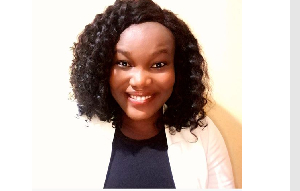 Marcelline Amouzou, a Ghanaian policy analyst based in the United States
Marcelline Amouzou, a Ghanaian policy analyst based in the United States
As African nations face mounting environmental challenges—ranging from pollution to the impacts of resource extraction—policy experts are leveraging data-driven research to transform regional conversations into actionable strategies.
Among these leaders is Marcelline Amouzou, a Ghanaian policy analyst based in the United States, whose work is shaping sustainable policy frameworks across the continent.
Amouzou’s groundbreaking contributions through Afrobarometer and the Center for Democratic Development Ghana (CDD-Ghana) provide critical insights into environmental issues confronting countries like Eswatini and Niger. Her research prioritizes empirical evidence, strengthening environmental governance while promoting economic growth and ecological stewardship in tandem.
In a study titled “Emaswati Call on Government and Fellow Citizens to Tackle the ‘Serious Problem’ of Pollution,” published by Afrobarometer, the Institute for Justice and Reconciliation (IJR), and QA Strategic Information, Amouzou highlights the environmental crises facing Eswatini.
The research reveals that 60% of Emaswati identify pollution—including trash disposal, water contamination, and plastic waste—as a significant local issue.
While many believe community-led cleanup efforts are essential, an overwhelming 90% of respondents call for stronger government intervention. However, a critical trade-off emerges: three-fifths of respondents prioritize economic opportunities over stringent environmental safeguards.
“This underscores the challenge of balancing economic progress with environmental stewardship—a pressing issue not just in Eswatini but also in Ghana and beyond,” Amouzou noted in an interview with the media.
In Niger, Amouzou’s research emphasizes the need for sustainable practices in the face of deforestation and pollution. Her study, “Nigeriens Demand Greater Environmental Action, But Not at Expense of Jobs and Incomes,” published by Afrobarometer, CDD-Ghana, and LASDEL, reveals that deforestation is Niger’s top environmental concern.
While nearly 60% of respondents acknowledge the economic benefits of resource extraction, a decisive 74% advocate for stricter government oversight to mitigate environmental harm.
“Unlike Eswatini, Niger’s environmental discourse increasingly focuses on achieving a sustainable equilibrium between ecological integrity and economic advancement,” Amouzou explained.
This shift reflects a growing recognition of the need for balanced policy approaches that safeguard ecosystems without compromising livelihoods.
Drawing on findings from across Africa, Amouzou’s work underscores a consistent theme; citizens want coordinated, inclusive action from governments, industry stakeholders, and local communities.
Her recommendations include implementing rigorous air and water quality standards, particularly in industrial areas bordering residential neighborhoods.
These measures not only address pollution but also empower communities to monitor industrial compliance, ensuring that citizens remain active guardians of their environmental interests.
Amouzou’s research has been integrated into policy frameworks, helping leaders envision a future where economic prosperity and environmental well-being reinforce each other. Her data-driven strategies serve as templates for developing nations seeking sustainable growth through effective resource management.
Reflecting on her work, Amouzou expressed optimism about the continent’s trajectory; “Africa’s future can be one where resilient ecosystems and robust economic opportunities sustain and enhance one another for generations to come.”
Through her innovative research and policy advocacy, Marcelline Amouzou continues to lead efforts to bridge the gap between environmental challenges and sustainable solutions, offering a model for the rest of the world to follow.
Watch some videos from the recent Parliamentary sittings below: